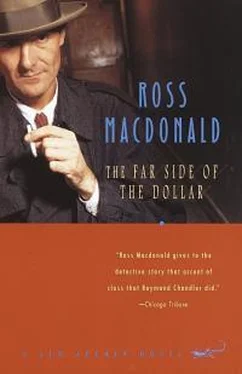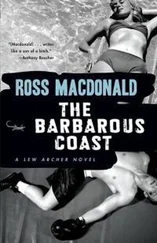“I forbid–” He changed his tone, and started the sentence over: “I beg of you, please hold off: Give him until morning to come home. He’s my only son.”
“All right. Till morning. We can’t bottle it up any longer than that, and we shouldn’t.”
I hung up and stepped out into the corridor. Instead of taking me back to the emergency ward, my escort took me up in an elevator to a special room with heavy screens on the windows. They let me lie down on the bed, and took turns questioning me. It would be tedious to recount the dialogue. It was tedious at the time, and I didn’t listen to all of it.
Some time around midnight a sheriffs lieutenant named Bastian came into the room and ordered the deputies out into the hall. He was a tall man, with iron-gray hair clipped short. The vertical grooves in his cheeks looked like the scars inflicted by a personal discipline harsher than saber cuts.
He stood over me frowning. “Dr. Murphy says you’re feeling critical of law enforcement in this county.”
“I’ve had reason.”
“It isn’t easy recruiting men at the salaries the supervisors are willing to pay. We can hardly compete with the wages for unskilled labor. And this is a tough job.”
“It has its little extra compensations.”
“What does that mean?”
“I seem to be missing my wallet.”
Bastian’s face went grim. He marched out into the hall, made some remarks in a voice that buzzed like a hornet, and came back carrying my wallet. I counted the money in it, rather obtrusively.
“It was used to check you out,” Bastian said. “LA County gives you a good rating, and I’m sorry if you weren’t treated right.”
“Think nothing of it. I’m used to being pushed around by unskilled labor.”
“You heard me apologize,” he said, in a tone that closed the subject.
Bastian asked me a number of questions about Mrs. Brown and the reason for my interest in her. I told him I’d have to check with my client in the morning, before I could open up. Then he wanted everything I could give him about Brown’s appearance and car.
The moments before and after the shot were vague in my memory. I dredged up what I could. Brown was a man of better than medium size, physically powerful, not young, not old. He was wearing a dark gray or blue jacket and a wide-brimmed grayish hat which shadowed his eyes. The lower part of his face was heavy jawed. His voice was rough, with a slight wheeze in it. The car was a dirty white or tan two-door sedan, probably a Ford, about eight years old.
I learned two facts from Lieutenant Bastian: the car had an Idaho license, according to other tenants of the court, and Stanislaus was in trouble for keeping no record of the license number. I think Bastian gave me these facts in the hope of loosening my tongue. But he finally agreed to wait till morning.
They shifted me to another room on the same floor, unguarded. I spent a good part of the night, waking and sleeping, watching a turning wheel of faces. The faces were interspersed from time to time with brilliant visions of Dack’s Auto Court. Its green ugliness was held in the selective sunset glare, as if it was under a judgment, and so was I.
MORNING WAS WELCOME, in spite of the pain in my head. I couldn’t remember eating anything but Mrs. Perez’s cheese sandwich since the previous morning. The tepid coffee and over-scrambled eggs tasted like nectar and ambrosia.
I was finishing breakfast when Dr. Sponti arrived, breathing rapidly and audibly. His plump face bore the marks of a bad night. He had sleepless bruises around the eyes, and a gash in his upper lip where his razor had slipped. The chilly hand he offered me reminded me of the dead woman’s, and I dropped it.
“I’m surprised you knew I was here.”
“I found out in a rather circuitous way. A Lieutenant Bastian phoned me in the middle of the night. Evidently he saw the check I gave you yesterday morning. He asked me a great many questions.”
“About me?”
“About the whole situation involving you and Tom Hillman.”
“You told him about Tom Hillman?”
“I had no choice, really.”
He picked at the fresh scab on his lip. “A woman has been murdered in Ocean View. I was honor bound to provide the authorities with all the information I could. After all–”
“Does this include the business of the ransom money?”
“Naturally it does. Lieutenant Bastian considered it highly important. He thanked me effusively, and promised that the name of the school would be kept out of the papers.”
“Which is the main thing.”
“It is to me,” Sponti said. “I’m in the school business.”
It was frustrating to have held out for nothing, and to have no secrets to trade with Bastian. But it was relieving, too, that the thing was out in the open. Hillman’s imposition of silence had made it hard for me to do my job. I said: “Have you had any repercussions from Ralph Hillman?”
“He phoned early this morning. The boy is still on the missing list.”
Sponti’s voice was lugubrious, and his eyes rolled heavily toward me. “The parents are naturally quite frantic by this time. Mr. Hillman said things I’m sure he’ll regret later.”
“Is he still blaming you for the kidnapping?”
“Yes, and he blames me for bringing you into the case. He seems to feel you broke faith with him, shall we say.”
“By going to the auto court and getting myself shot?”
“You frightened off the kidnappers, in his opinion, and prevented them from returning his son to him. I’m very much afraid he wants nothing more to do with you, Mr. Archer.”
“And neither do you?”
Dr. Sponti pursed his lips and brought his ten fingers together in the air. They made a Norman arch and then a Gothic one. “I’m sure you understand the pressures I’m under. I’m virtually obliged to do as Mr. Hillman wishes in his extremity.”
“Sure.”
“And I’m not going to ask you to refund any part of your check. The entire two hundred and fifty dollars is yours, even though you’ve been in my employ” – he looked at his watch – “considerably less than twenty-four hours. The unearned surplus will take care of your medical expenses, I’m sure.”
He was backing toward the door. “Well, I have to run.”
“Go to hell,” I said as he went out.
He poked his head in again: “You may regret saying that. I’m tempted to stop payment on that check after all.”
I made an obscene suggestion as to the disposition of the check. Dr. Sponti turned as blue as a Santa Clara plum and went away. I lay and enjoyed my anger for a while. It went so nicely with the reciprocating ache in my head. And it helped to cover over the fact that I had let myself in for this. I shouldn’t have gone the second time to Dack’s Auto Court, at least not when I did.
A nurse’s aide came in and took away my tray. Later a doctor palpated my skull, looked into my eyes with a tiny light, and told me I probably had a slight concussion but so had a lot of other people walking around. I borrowed a safety razor from an orderly, shaved and dressed, and went down to the cashier’s window and paid my bill with Sponti’s check.
I got over two hundred dollars change. Riding downtown in a taxi, I decided I could afford to spend another day on the case, whether Dr. Sponti liked it or not. I told the driver to let me off at the Telephone Company.
“You said the courthouse.”
“The telephone company. We’ve had a change of plan.”
“You should have said so in the first place.”
“Forgive my failure of leadership.”
I was feeling bitter and bright. It had to do with the weather, which had turned sunny, but more to do with my decision to spend my own time on a boy I’d never seen. I didn’t tip the driver.
Читать дальше












